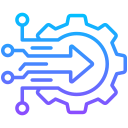Revolutionizing Sectors: AI Innovations for 2025
Healthcare’s AI-Powered Leap
Artificial intelligence is revolutionizing the accuracy and speed of medical diagnostics. Leveraging vast datasets and advanced pattern recognition, AI systems can identify anomalies in medical images, flag early symptoms, and assist healthcare professionals in making timely, precise decisions. As we move into 2025, these diagnostic advancements promise to curtail human error and reduce wait times, ensuring patients get the care they need more swiftly. Radiology, pathology, and general practice are witnessing elevated standards of excellence, making AI an indispensable partner in the battle against disease.
Through intelligent data analysis, AI is enabling truly personalized medicine. Algorithms process a patient’s genetic, clinical, and lifestyle data to recommend individualized treatment plans, increasing success rates and minimizing adverse effects. With predictive analytics, clinicians can anticipate health risks and intervene before complications arise. In 2025, ongoing AI development is set to make customized care available to broader populations, bridging gaps in healthcare equity and enhancing outcomes across demographics.
AI is making healthcare administration smarter by optimizing resource allocation, scheduling, and patient flow. Machine learning models predict peaks in service demand, ensuring that staff and facilities are used efficiently. Automated systems minimize paperwork, reduce administrative errors, and allow clinicians to dedicate more time to patient care. As hospitals adopt advanced AI management tools in 2025, operational efficiency will reach new heights, translating into better experiences for both patients and healthcare professionals.


Adaptive Learning Systems
AI-driven adaptive learning platforms are personalizing education by adjusting content, pace, and difficulty based on individual student needs. These systems analyze performance in real-time, identifying areas of strength and opportunities for growth. Educators can access actionable insights, enabling targeted interventions and maximizing each learner’s potential. As AI continues to mature, adaptive learning will empower students of all backgrounds and learning styles to thrive.

Intelligent Tutoring Assistants
The rise of AI-powered tutoring assistants is transforming supplementary education. These digital tutors provide instant feedback, answer questions, and offer tailored practice exercises. Available around the clock and scalable across geographies, they break down barriers to effective learning outside the classroom. By 2025, AI tutors are expected to further refine their understanding of student behavior, delivering more responsive and human-like support.

Predictive Analytics for Student Success
Educational institutions are leveraging predictive analytics to anticipate student needs and proactively address challenges. By analyzing trends in attendance, performance, and engagement, AI systems can identify at-risk students and recommend timely interventions. These predictive insights empower teachers and administrators to respond before issues escalate, ultimately reducing dropout rates and elevating overall student achievement. The coming year promises even more sophisticated analytics capabilities, enhancing educational outcomes on a global scale.
Logistics Transformed by Intelligent Automation
Autonomous Delivery Solutions
AI is leading the development of autonomous vehicles and drones that streamline last-mile delivery. These self-navigating machines use machine vision and real-time data to optimize routes, avoid obstacles, and ensure timely delivery with minimal human intervention. In 2025, widespread adoption promises to redefine convenience for consumers and drastically lower operational costs for businesses, making fast, reliable deliveries accessible to all.
Dynamic Supply Chain Optimization
Machine learning algorithms are transforming supply chain management by providing deeper visibility and predictive power. AI monitors market trends, weather events, and transportation patterns, enabling proactive adjustments and preventing bottlenecks. Real-time data sharing between stakeholders increases transparency and builds resilience, ensuring products reach their destinations on time. The integration of AI tools in 2025 is set to raise the bar for responsiveness and adaptability in global logistics networks.
Intelligent Inventory Management
AI-driven inventory management systems analyze sales data, seasonal fluctuations, and purchasing behaviors to optimize stock levels automatically. These solutions minimize overstock and shortages, freeing up capital and reducing waste. By continually refining their forecasts, intelligent systems support just-in-time delivery, ensuring businesses remain nimble amidst demand fluctuations. As we look to 2025, inventory management powered by AI promises a new era of efficiency and profitability.
